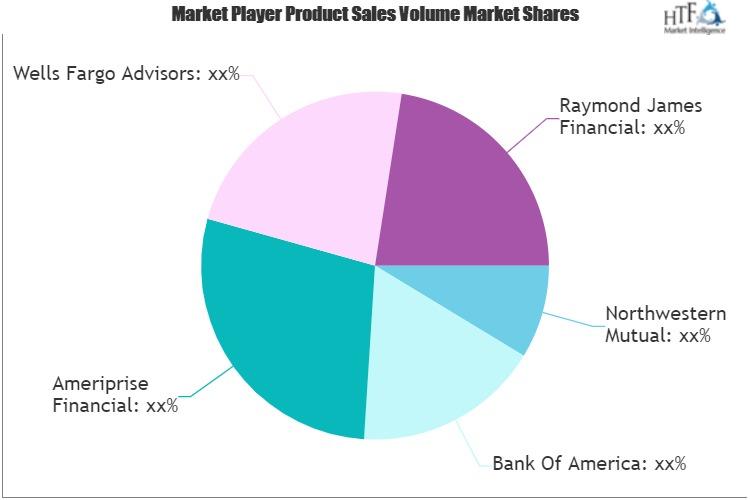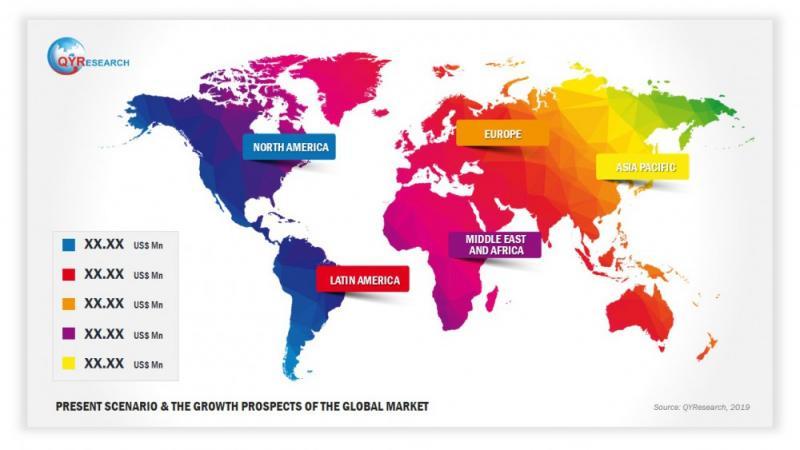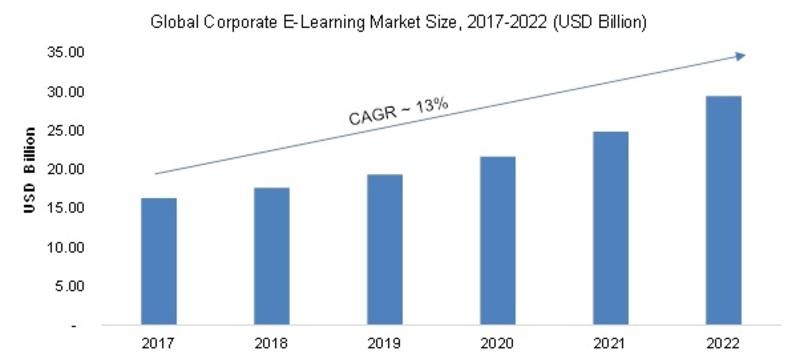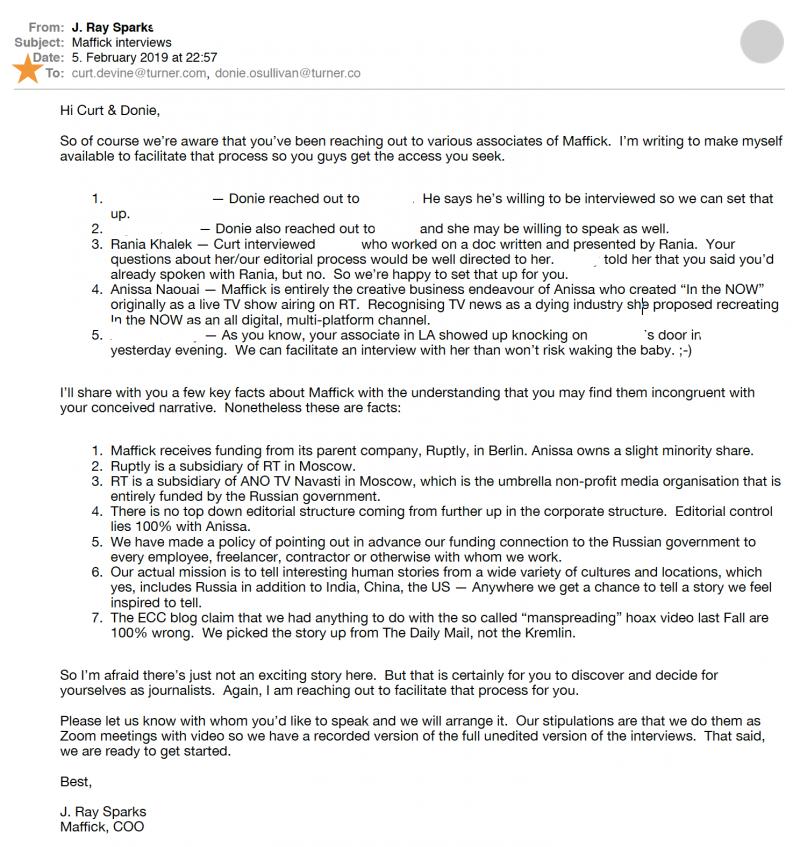Press release
Facebook Face-Palms Over Russian-Backed Media Following CNN Report
The blogosphere is buzzing about Facebook censorship after they unprecedentedly shut down verified pages with millions of followers based solely on paranoia peddled by CNN.
Why would Facebook shut down verified pages with millions of followers when they were well known to the social behemoth to be supported by Russian public media? This was far from a secret and was certainly not news. The main Page In the NOW is nearly three years old and has been well known to Facebook as part of the RT News group, which has been an advertising customer of Facebook’s for many years. The answer: A rush to judgement following conspiracy mongering by CNN reporters Curt Devine & Donie O’Sullivan. At the center of the controversy is a scrappy Berlin-based startup called Maffick.
What is Maffick, who runs it and what do they do?
Maffick founder, CEO, principal shareholder and native New Yorker Anissa Naouai says she chose an archaic English verb as her brand because its meaning perfectly fit her mission. “Maffick means telling stories boisterously with a sense of humor and excitement!” She and COO J. Ray Sparks formed Maffick in May 2018 as a holding company from which to manage In the NOW and to build a commercial video marketing agency. Their startup capital was principally financed by parent company Ruptly, a subsidiary of RT.
In late 2018 Maffick published three new Facebook Pages. Drawing upon previously published content from In the NOW Maffick published Waste-Ed, which focuses on environmental sustainability, climate change and green business. They soon followed with a channel delivering fresh perspectives on historical stories called BackThen. Finally, and perhaps most pertinent to why CNN targeted them for investigation, Maffick launched a channel called Soapbox which presents a variety of social and political stories with amped-up opinion segments from American hosts like Rania Khalek and Naouai herself.
Many Soapbox videos are critical of US policies and actions, similarly to other independent American publishers such as TYT, Democracy Now and a slew of late night political comedy hits like John Oliver and Hassan Minaj. Yet when Soapbox features an American citizen critiquing her own government’s actions or policies, the Pavlovian response of American mainstream media is to conjure up a master plan leading straight back to Red Square. After all, facts are seldom as engaging as folklore.
What about the editorial process? Does Russia dictate or influence editorial decisions?
“Our editorial process is really a round table team effort, with everyone contributing ideas for stories and bouncing them around the group for feedback. I’m the big bad boss of course, so I give the green light and then we all scurry into action. I work closely with our chief editor, channel managers, producers, etc, until each team feels not just ok, but excited to publish our videos. After publishing we measure analytics and factor in just what and how much data we want to drive our next story. That’s it. That’s Maffick’s entire editorial cycle in a nutshell,” says Naouai.
CNN determined to build a ratings worthy narrative
Early in February 2019 CNN was allegedly contacted by a disgruntled former contractor of Maffick's who accused them of being part of a new secret Russian plot to undermine American Democracy by targeting millennials on social media. Devine and O’Sullivan then contacted several other Maffick associates who immediately forwarded their messages to management. They enlisted the help of LA-based CNN reporter Scott Glover who showed up at one female associate’s home unannounced, knocking on her door. CNN acknowledged in print that all of the contractors with whom they spoke confirmed that Maffick had indeed informed them in advance of the company’s funding connection to Russian public media. Sparks immediately reached out to Devine and O’Sullivan, volunteering detailed information about Maffick and explaining the details of In the NOW’s longstanding and well known relationship to RT.
Nevertheless CNN continued to pursue a conspiratorial narrative, seeking and finding support from NATO member-based think tank The German Marshall Fund, ironically financed through a consortium of public-private entities led by government-owned German banking giant KfW. Of course, as is the established norm, none of The German Marshall Fund’s financial backers are displayed on their own Facebook Page. Nevertheless CNN’s Drew Griffin interviewed recent intern with the US State Department in Moscow Bret Schafer, who assured for the camera, “Oh they’re definitely state funded, I mean, you can pull the German registration data,” conveniently restating facts of which CNN had already been informed in writing by Maffick themselves. Thus CNN engineered the false impression that there was potentially a sensational new Russian secret, perhaps even one Facebook should fear and one on which it should urgently take action.
It worked. With all the trouble and hysteria Facebook has faced relating to Russian issues, who could blame them for taking the unprecedented step of shutting down Maffick’s pages with no prior notice or communication, despite Maffick being fully compliant with Facebook’s policies? After all, CNN, “America’s most trusted name in news,” had “alerted” them to a “potential new Russian threat.”
Facebook’s response was to require Maffick to publish their entire parent company hierarchy as the most prominent information on all of their pages, rather than including that information in the “Impressum” section as clearly intended by Facebook’s own design. Writing via email, Facebook Public Policy Manager Semjon Rens specified, “…the very top should read ‘Maffick Media GMBH is owned by RUPTLY a subsidiary of RT.’”
Why double standards matter to everyone
The problem with Facebook’s response to CNN’s narrative is that it singles out Russian publicly funded media while falling short of publishing a clear public policy that would apply to a long list of other media Pages on Facebook. Facebook policies currently make such disclosure voluntary and few if any of the scores of publicly financed media outlets do so on their Facebook Pages. Maffick’s public media industry peers, such as AJ+, BBC, CBC and others, have remained online throughout Facebook’s blackout of Maffick. By singling out Russia, especially the type of mainstream human interest content produced by Maffick, Facebook risks setting a dangerous precedent on censorship that could inadvertently reenforce the xenophobic paranoia surrounding the controversy over alleged Russian involvement in US politics.
But Facebook says they plan to implement this requirement across ALL pages in the future.
While offering no specific timeline for doing so, Rens said, “…as far as I know we are in the middle of rolling this out for all Pages, similar to your pages, so it would definitely be a coherent approach. It’s not something we’re rolling out just for you." As to the question of whether Maffick will be the first company upon which this new requirement is to be imposed, Rens was uncertain, saying, “This is something that we’re rolling out currently… It’s possible that’s there’s no other page, but I’m not 100% sure.”
New. Policy. Needed.
The fix for Facebook is easy. Facebook needs to publish policy that comprehensively applies to all businesses that are more than ten percent financed, either directly or indirectly, by any type of government funding, be it via direct tax, mandatory media fees or other transactional devices. Americans and media consumers across the rest of the world deserve to have full transparency regarding who pays for the relentless stream of content with which they are daily presented. If they single out Russia, in the case of Maffick, Facebook will become political activists in the way they choose to selectively apply such policies, now and in the future. Sparks summed up the issue saying, ”We just need a set of rules that works for ALL of the world’s public media on Facebook.”
Maffick amplifies brands via top notch visual storytelling. Our flagship channel “In the NOW” has achieved billions of views on Facebook with over four million loyal fans. We are a startup based Berlin where we have launched three new channels: “Waste-Ed” focuses on stories related to global sustainability. “BackThen” takes a look at history from a fresh angle. “Soapbox” takes on socio-political issues with commentary from progressive voices like Anissa Naouai, Rania Khalek and more.
Maffick Media GmbH
Kemperplatz 1, 10785, Berlin
Managing Directors: Anissa Naouai & J. Ray Sparks
Email: Hello@Maffick.media
Phone: +49 163 001 8820
Commercial Registry Location: Amtsgericht Charlottenburg (Berlin)
Commercial Registry Number: HRB 194625 B
VAT-ID Number: DE317616027
Why would Facebook shut down verified pages with millions of followers when they were well known to the social behemoth to be supported by Russian public media? This was far from a secret and was certainly not news. The main Page In the NOW is nearly three years old and has been well known to Facebook as part of the RT News group, which has been an advertising customer of Facebook’s for many years. The answer: A rush to judgement following conspiracy mongering by CNN reporters Curt Devine & Donie O’Sullivan. At the center of the controversy is a scrappy Berlin-based startup called Maffick.
What is Maffick, who runs it and what do they do?
Maffick founder, CEO, principal shareholder and native New Yorker Anissa Naouai says she chose an archaic English verb as her brand because its meaning perfectly fit her mission. “Maffick means telling stories boisterously with a sense of humor and excitement!” She and COO J. Ray Sparks formed Maffick in May 2018 as a holding company from which to manage In the NOW and to build a commercial video marketing agency. Their startup capital was principally financed by parent company Ruptly, a subsidiary of RT.
In late 2018 Maffick published three new Facebook Pages. Drawing upon previously published content from In the NOW Maffick published Waste-Ed, which focuses on environmental sustainability, climate change and green business. They soon followed with a channel delivering fresh perspectives on historical stories called BackThen. Finally, and perhaps most pertinent to why CNN targeted them for investigation, Maffick launched a channel called Soapbox which presents a variety of social and political stories with amped-up opinion segments from American hosts like Rania Khalek and Naouai herself.
Many Soapbox videos are critical of US policies and actions, similarly to other independent American publishers such as TYT, Democracy Now and a slew of late night political comedy hits like John Oliver and Hassan Minaj. Yet when Soapbox features an American citizen critiquing her own government’s actions or policies, the Pavlovian response of American mainstream media is to conjure up a master plan leading straight back to Red Square. After all, facts are seldom as engaging as folklore.
What about the editorial process? Does Russia dictate or influence editorial decisions?
“Our editorial process is really a round table team effort, with everyone contributing ideas for stories and bouncing them around the group for feedback. I’m the big bad boss of course, so I give the green light and then we all scurry into action. I work closely with our chief editor, channel managers, producers, etc, until each team feels not just ok, but excited to publish our videos. After publishing we measure analytics and factor in just what and how much data we want to drive our next story. That’s it. That’s Maffick’s entire editorial cycle in a nutshell,” says Naouai.
CNN determined to build a ratings worthy narrative
Early in February 2019 CNN was allegedly contacted by a disgruntled former contractor of Maffick's who accused them of being part of a new secret Russian plot to undermine American Democracy by targeting millennials on social media. Devine and O’Sullivan then contacted several other Maffick associates who immediately forwarded their messages to management. They enlisted the help of LA-based CNN reporter Scott Glover who showed up at one female associate’s home unannounced, knocking on her door. CNN acknowledged in print that all of the contractors with whom they spoke confirmed that Maffick had indeed informed them in advance of the company’s funding connection to Russian public media. Sparks immediately reached out to Devine and O’Sullivan, volunteering detailed information about Maffick and explaining the details of In the NOW’s longstanding and well known relationship to RT.
Nevertheless CNN continued to pursue a conspiratorial narrative, seeking and finding support from NATO member-based think tank The German Marshall Fund, ironically financed through a consortium of public-private entities led by government-owned German banking giant KfW. Of course, as is the established norm, none of The German Marshall Fund’s financial backers are displayed on their own Facebook Page. Nevertheless CNN’s Drew Griffin interviewed recent intern with the US State Department in Moscow Bret Schafer, who assured for the camera, “Oh they’re definitely state funded, I mean, you can pull the German registration data,” conveniently restating facts of which CNN had already been informed in writing by Maffick themselves. Thus CNN engineered the false impression that there was potentially a sensational new Russian secret, perhaps even one Facebook should fear and one on which it should urgently take action.
It worked. With all the trouble and hysteria Facebook has faced relating to Russian issues, who could blame them for taking the unprecedented step of shutting down Maffick’s pages with no prior notice or communication, despite Maffick being fully compliant with Facebook’s policies? After all, CNN, “America’s most trusted name in news,” had “alerted” them to a “potential new Russian threat.”
Facebook’s response was to require Maffick to publish their entire parent company hierarchy as the most prominent information on all of their pages, rather than including that information in the “Impressum” section as clearly intended by Facebook’s own design. Writing via email, Facebook Public Policy Manager Semjon Rens specified, “…the very top should read ‘Maffick Media GMBH is owned by RUPTLY a subsidiary of RT.’”
Why double standards matter to everyone
The problem with Facebook’s response to CNN’s narrative is that it singles out Russian publicly funded media while falling short of publishing a clear public policy that would apply to a long list of other media Pages on Facebook. Facebook policies currently make such disclosure voluntary and few if any of the scores of publicly financed media outlets do so on their Facebook Pages. Maffick’s public media industry peers, such as AJ+, BBC, CBC and others, have remained online throughout Facebook’s blackout of Maffick. By singling out Russia, especially the type of mainstream human interest content produced by Maffick, Facebook risks setting a dangerous precedent on censorship that could inadvertently reenforce the xenophobic paranoia surrounding the controversy over alleged Russian involvement in US politics.
But Facebook says they plan to implement this requirement across ALL pages in the future.
While offering no specific timeline for doing so, Rens said, “…as far as I know we are in the middle of rolling this out for all Pages, similar to your pages, so it would definitely be a coherent approach. It’s not something we’re rolling out just for you." As to the question of whether Maffick will be the first company upon which this new requirement is to be imposed, Rens was uncertain, saying, “This is something that we’re rolling out currently… It’s possible that’s there’s no other page, but I’m not 100% sure.”
New. Policy. Needed.
The fix for Facebook is easy. Facebook needs to publish policy that comprehensively applies to all businesses that are more than ten percent financed, either directly or indirectly, by any type of government funding, be it via direct tax, mandatory media fees or other transactional devices. Americans and media consumers across the rest of the world deserve to have full transparency regarding who pays for the relentless stream of content with which they are daily presented. If they single out Russia, in the case of Maffick, Facebook will become political activists in the way they choose to selectively apply such policies, now and in the future. Sparks summed up the issue saying, ”We just need a set of rules that works for ALL of the world’s public media on Facebook.”
Maffick amplifies brands via top notch visual storytelling. Our flagship channel “In the NOW” has achieved billions of views on Facebook with over four million loyal fans. We are a startup based Berlin where we have launched three new channels: “Waste-Ed” focuses on stories related to global sustainability. “BackThen” takes a look at history from a fresh angle. “Soapbox” takes on socio-political issues with commentary from progressive voices like Anissa Naouai, Rania Khalek and more.
Maffick Media GmbH
Kemperplatz 1, 10785, Berlin
Managing Directors: Anissa Naouai & J. Ray Sparks
Email: Hello@Maffick.media
Phone: +49 163 001 8820
Commercial Registry Location: Amtsgericht Charlottenburg (Berlin)
Commercial Registry Number: HRB 194625 B
VAT-ID Number: DE317616027
Permanent link to this press release:
Copy
Please set a link in the press area of your homepage
to this press release on woodPRI. woodPRI disclaims liability for any content contained in
this release.
Recommend

/newsMicroencapsulation Market Deep Analysis on Key Players - Dow Corning, Encapsys, Syngenta Crop Protection, Evonik Industries, 3M and Bayer
Market Study Report Adds Global Microencapsulation Market Size, Status and Forecast 2024 added to its database. The report provides key statistics on the current state of the industry and other analytical data to understand the market.
Extensive research is required for choosing the appropriate cor...

/newsGermany Airbag Market Size 2023: Global Share, Industry And Report Analysis By 2030 | Hyundai Mobis Co., Ltd. Key Safety Systems, Inc. Robert Bosch GmbH
Germany airbag market is expected to grow at a CAGR of around 6% during the forecast period. Germany Airbag Market research report refers to gathering and analyzing significant market data serve as best medium for various industry players to launch novel product or service. It is vital for key firms...

/newsSecurities Brokerages And Stock Exchanges Market Outlook 2021: Big Things are Happening
A new intelligence report released by HTF MI with title "Global Securities Brokerages And Stock Exchanges Market Survey & Outlook" is designed covering micro level of analysis by Insurers and key business segments, offerings and sales channels. The Global Securities Brokerages And Stock Exchange...

/newsRenewable Chemicals Market Emerging Trends and Competitive Landscape Forecast to 2028
The renewable chemicals market was valued at US$ 80,566.30 million in 2021 and is projected to reach US$ 1,76,750.76 million by 2028 it is expected to grow at a CAGR of 11.9% from 2021 to 2028. The research report focuses on the current market trends, opportunities, future potential of the market, a...

/newsHow Coronavirus is Impacting Cold Brew Coffee, Global Market Volume Analysis, Size, Share and Key Trends 2020-2026
"Market Latest Research Report 2020:
Los Angles United States, February 2020: The Cold Brew Coffee market has been garnering remarkable momentum in the recent years. The steadily escalating demand due to improving purchasing power is projected to bode well for the global market. QY Research's lates...

/newsCorporate E-Learning Market - Global Industry Size, Share, Key Players Analysis that are Infor, SkillSoft Corporation, Adrenna, CERTPOINT Systems and others with Regional Forecast to 2022
Overview:
E-Learning is used to enhance the learning procedures for newer job requirements and to make employees sound about the internal and external changes in the market and respective organizations. This method has created considerable differences in the ways of training and developing employee...
